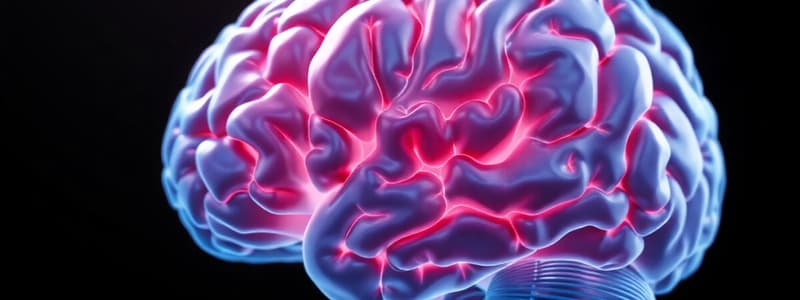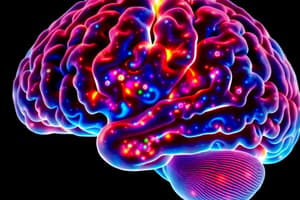Podcast
Questions and Answers
Which of the following structures is located between the caudate and lentiform nuclei?
Which of the following structures is located between the caudate and lentiform nuclei?
- Hypothalamus
- Hippocampus
- Thalamus (correct)
- Cerebellum
The basal nuclei are found exclusively in the cerebral cortex.
The basal nuclei are found exclusively in the cerebral cortex.
False (B)
What is the primary function of the basal nuclei?
What is the primary function of the basal nuclei?
Regulation of motor functions and voluntary movement
The _____ nucleus is part of the basal nuclei that provides indirect feedback to the cerebral cortex.
The _____ nucleus is part of the basal nuclei that provides indirect feedback to the cerebral cortex.
Match each basal nucleus to its description:
Match each basal nucleus to its description:
Which part of the brain is responsible for higher cognitive functions, including thought and action?
Which part of the brain is responsible for higher cognitive functions, including thought and action?
The telencephalon includes the rhinencephalon, which is associated with the sense of smell.
The telencephalon includes the rhinencephalon, which is associated with the sense of smell.
What type of fibers are responsible for interconnecting different parts of the same hemisphere in the brain?
What type of fibers are responsible for interconnecting different parts of the same hemisphere in the brain?
The _______ is the outermost layer of the brain responsible for complex functions such as reasoning, emotion, and planning.
The _______ is the outermost layer of the brain responsible for complex functions such as reasoning, emotion, and planning.
Which of the following bones does not contribute to the neurocranium?
Which of the following bones does not contribute to the neurocranium?
Match the following parts of the telencephalon with their functions:
Match the following parts of the telencephalon with their functions:
The brain is solely responsible for the regulation of bodily movement.
The brain is solely responsible for the regulation of bodily movement.
Name the main component of the brain responsible for processing sensory information and coordinating motor functions.
Name the main component of the brain responsible for processing sensory information and coordinating motor functions.
Which part of the brain is primarily involved in processing higher cognitive functions?
Which part of the brain is primarily involved in processing higher cognitive functions?
The telencephalon includes the pons and cerebellum.
The telencephalon includes the pons and cerebellum.
What is the primary role of the diencephalon?
What is the primary role of the diencephalon?
The telencephalon contains structures such as the __________ and the __________.
The telencephalon contains structures such as the __________ and the __________.
Match the following components of the brain with their primary functions:
Match the following components of the brain with their primary functions:
Which region of the telencephalon is involved in sensory processing?
Which region of the telencephalon is involved in sensory processing?
The medulla oblongata is part of the telencephalon.
The medulla oblongata is part of the telencephalon.
Name one structure located in the telencephalon.
Name one structure located in the telencephalon.
Flashcards
Telencephalon
Telencephalon
The anterior part of the forebrain, which includes the cerebral hemispheres.
Cerebral Hemispheres
Cerebral Hemispheres
The two main parts of the telencephalon; they are responsible for higher-level functions.
Archiocortex
Archiocortex
The oldest part of the cerebral cortex, involved in olfaction and emotions.
Paleocortex
Paleocortex
Signup and view all the flashcards
Neocortex
Neocortex
Signup and view all the flashcards
Brain (encephalon)
Brain (encephalon)
Signup and view all the flashcards
Cranial cavity
Cranial cavity
Signup and view all the flashcards
Brain Functions
Brain Functions
Signup and view all the flashcards
Internal Capsule
Internal Capsule
Signup and view all the flashcards
Basal Nuclei
Basal Nuclei
Signup and view all the flashcards
Caudate Nucleus
Caudate Nucleus
Signup and view all the flashcards
Putamen Nucleus
Putamen Nucleus
Signup and view all the flashcards
Globus Pallidus
Globus Pallidus
Signup and view all the flashcards
Rhombencephalon
Rhombencephalon
Signup and view all the flashcards
Prosencephalon
Prosencephalon
Signup and view all the flashcards
Brainstem
Brainstem
Signup and view all the flashcards
Study Notes
Cerebrum - Telencephalon
- The telencephalon comprises the cerebral hemispheres, archicórtex, paleocortex (rhinencephalon), and neocortex.
- Cerebral hemispheres include the cerebral cortex, cerebral white matter and basal nuclei.
- The archicórtex includes the hippocampus, fornix and mammillary bodies.
- The paleocortex is associated with the rhinencephalon.
- The neocortex is the predominant part of the cerebral cortex in mammals, and has six layers.
- White matter includes association fibers, commissural fibers (e.g., corpus callosum), and projection fibers.
Brain (Encephalon)
- The brain (encephalon) controls the body's organs, and regulates, coordinates, and integrates the nervous system.
- Functional abilities of the brain is reflected in its morphology.
- Bones that form the cranial cavity include frontal, parietal, occipital, temporal, ethmoid, and sphenoid bones.
Anatomical Orientations
- Sagittal plane: A plane dividing the brain into right and left portions.
- Horizontal (dorsal) plane: A plane perpendicular to the sagittal plane, dividing the brain into dorsal and ventral portions.
- Transverse plane: A plane perpendicular to both the sagittal and horizontal planes, dividing the brain into rostral and caudal portions.
- Unilateral: Relating to one side of the body.
- Bilateral: Relating to both sides of the body.
- Ipsilateral: Relating to the same side of the body.
- Contralateral: Relating to the opposite side of the body.
Cerebral Cortex
- The external surface of the cerebral hemispheres is composed of gyri (ridges) and sulci (grooves), increasing surface area.
- Different gyri and sulci are named based on their arrangement and location.
Cerebral Cortex (External Anatomy)
- Gyri: Outward folds (ridges) on the cerebral cortex surface.
- Sulci: Inward folds (grooves) on the cerebral cortex surface.
- The folding of the cerebral cortex increases its surface area.
Cerebrum - Telencephalon (Comparative Anatomy of Brains)
- During gestation, some animals, like carnivores or primates, have a smooth brain surface (lissencephalic). However, other animals' brain surface is convoluted (gyrencephalic).
- Brain weight in vertebrates is relative to body weight, with larger animals tending to have a higher white matter to grey matter ratio.
Studying That Suits You
Use AI to generate personalized quizzes and flashcards to suit your learning preferences.




